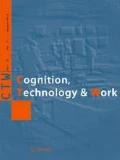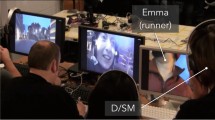Abstract
Rail network control is a function which depends upon the expertise of controllers for successful performance, and this expertise is situated in social skills and interactions as much as technical knowledge. A work analysis framework has been established which gets around some of the difficulties found in using cognitive work analysis, and allows structured investigation at the environment, domain, activity, scenario and expertise levels. Within this major research programme a video ethnography study was carried out to explore the work and work systems of the rail controllers in more detail, with specific reference to social interactions. Discussion centres around the strategies, communications, social relationships, learning and development and inter-team differences that were identified in the video ethnography.





Similar content being viewed by others
References
Bentley R, Rodden T, Sawyer P, Sommerville I, Hughes J, Randall D, Shapiro D (1992) Ethnographically-informed systems design for air traffic control. In Proceedings of CSCW ‘92, pp 123–129
Carayon P (2006) Human factors of complex sociotechnical systems. Appl Ergon 37:525–536
Chipman SF, Schraagen JM, Shavlin VLl (2000) Introduction to Cognitive task analysis. In: Schraagen JM, Chipman SF, Shalin VL (eds) Cognitive task analysis. Lawrence Erlbaum Associates, Mahwah, pp 3–23
Clancey WJ (1997) Situated cognition: on human knowledge and computer representations. Cambridge University Press, Cambridge
Creswell JW (1998) Qualitative inquiry and research design: choosing among five traditions. Sage Publications, London
Cox G, Farrington-Darby T, Bye R (2007) From the horse’s mouth: the contribution of subject matter experts (SMEs) to rail research. In: Wilson JR, Norris BJ, Clarke T, Mills A (eds) People and rail systems: human factors at the heart of the railway. Ashgate Publishing, Abingdon
Engstrom Y, Middleton D (1996) Cognition and communication at work. Cambridge University Press, Cambridge
Farrington-Darby T (2008) Expertise and work of uk railway controllers: a field study. Unpublished PhD Thesis, University of Nottingham, Nottingham
Farrington-Darby T, Wilson JR (2006) The nature of expertise. Appl Ergon 37(1):17–32
Farrington-Darby T, Wilson JR, Norris BJ, Clarke T (2006) A naturalistic study of railway controllers. Ergonomics 49(12–13):1370–1394
Flach JM (2000) Discovering situated meaning: an ecological approach to task analysis. In: Shraagen JM, Chipman SF, Shalin VJ (eds) Cognitive task analysis. Lawrence Erlbaum Associates, Mahwah, pp 87–100
Flanagan JC (1954) The critical incident technique. Psychol Bull 51(4):327–359
Hammersley M, Atkinson P (1995a) What is ethnography? In: Hammerseley M, Atkinson P (eds) Ethnography: principles in practice, 2nd edn. Routledge, London, pp 1–22
Hammersley M, Atkinson P (1995b) Ethnography: principles in practice. Routledge, London
Hollnagel E, Cacciabue PC (1999) Cognition, technology and work: an introduction. Cognit Technol Work 1(1):1–6
Hollnagel E, Woods (2005) Joint cognitive systems: foundations of cognitive systems engineering. Taylor & Francis, London
Hutchins E (1995) Cognition in the wild. MIT Press, Cambridge
Klein G (1997) The recognition primed decision model: looking back, looking forward. In: Zsambok CE, Klein G (eds) Naturalistic decision making. Lawrence Erlbaum Associates, New Jersey, pp 285–292
Klein G, Calderwood R, MacGregor D (1983) Critical decision method for knowledge elicitation. IEEE Trans Syst Man Cybernet 19:462–472
Markus H, Zajonc R (1085) The cognitive perspective in social psychology. In: Lindzey G, Aronson G (eds) Handbook of social psychology, vol 1. Random House, New York, pp 137–230
Militello L, Hutton R (1998) Applied cognitive task analysis (ACTA): a practitioner’s toolkit for understanding cognitive demands. Ergonomics 4:1618–1641
Reynolds R, Brannick MT (2002) Thinking about work/thinking at work: cognitive task analysis. In: Tett RP, Hogan JC (eds) (Co-Chairs) Recent developments in cognitive and personality approaches to job analysis. Symposium presented at the 17th annual conference of the Society for Industrial and Organizational Psychology, Toronto
Rogers Y, Ellis J (1994) Distributed cognition: an alternative framework for analysing and explaining collaborative working. J Inf Technol 9(2):119–128
Suchman LA (1987) Plans and situated actions: the problem of human-machine communication. Cambridge University Press, Cambridge
Vicente KJ (1999) Cognitive work analysis. Toward safe, productive, and healthy computer-based work. Lawrence Erlbaum Associates, Mahwah
Wilson JR (2000) Fundamentals of ergonomics. Appl Ergon 31:557–567
Wilson JR, Jackson S, Nichols S (2003) Cognitive work investigation and design in practice: the influence of social context and social work artefacts. In: Hollnagel E (ed) Cognitive task design, pp 83–98
Wilson JR, Farrington-Darby T, Cox G, Bye R, Hockey GRJ (2007) The railway as a socio-technical system: human factors at the heart of successful rail engineering. In: Proceedings of IMechE, col 221, Part F. J Rail Rapid Transit 101–115
Acknowledgments
The work reported here was part of a much larger research programme, funded by EPSRC through Rail Research UK, and by Network Rail. Colleagues on the RRUK grant included Gemma Cox, Richard Bye and Bob Hockey, and we are very grateful for their contributions and insights. For Network Rail we thank the Ergonomics National Specialist Team for all their knowledge and efforts on behalf of our work, and also all the staff and managers in Control who contributed willingly and so significantly to the success of the work.
Author information
Authors and Affiliations
Corresponding author
Rights and permissions
About this article
Cite this article
Farrington-Darby, T., Wilson, J.R. Understanding social interactions in complex work: a video ethnography. Cogn Tech Work 11, 1–15 (2009). https://doi.org/10.1007/s10111-008-0118-z
Received:
Accepted:
Published:
Issue Date:
DOI: https://doi.org/10.1007/s10111-008-0118-z




